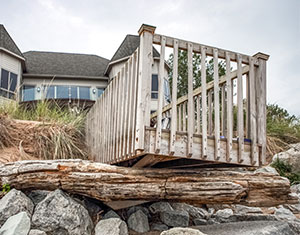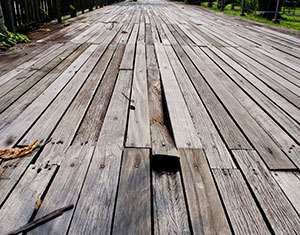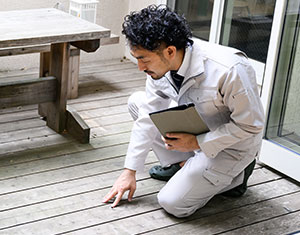What Happens in A Deck Collapse Injury Case?
Decks are mostly found in private homes, but there are other places such as restaurants, country clubs, or other non-residential spaces that may also have decks and balconies. A deck can establish a flat area in a space that isn’t flat and add more usable space to a property. Commonly made of wood, decks can also be constructed from a range of alternative materials. Composites, concretes, vinyl, rubber, PVC, and even aluminum are great alternatives to wood surfaces.
Decks also require upkeep, especially those built from wood. Over time, a wood deck can deteriorate due to continuous exposure to weather, termites, and other environmental factors. Degraded wood can break under normal pressure. But even a new deck can collapse if it’s poorly designed or constructed, damaged and not repaired, or not regularly maintained. An incorrectly designed or built deck can weaken and fall even with a small amount of weight.
Decks and balconies must be designed and constructed according to local building codes to be safe for anyone who steps on them. These codes were created to ensure that a deck is built to properly withstand weight limits as well as remain stable and secure while sustaining the elements outdoors.
One way a wood deck can fail is if it has been constructed with nails instead of wood screws. Once installed, nails have nothing to grip the way wood screws do, leaving the deck vulnerable to failure and collapse. Over time, the wood’s expanding and shrinking from changing weather conditions leaves the nail holes looser, leaving the nails in holes that are too large and allowing them to slip free.
Using roofing or other nails not designed for deck construction instead of wood screws leaves a deck or balcony vulnerable to collapse from the nails slipping from the wood. This is especially true in the case of a deck attached to a building with a ledger board and fastened only with nails instead of wood screws.
Further Reading: Understanding Proximate Cause in Negligence & Personal Injury
Proving Liability And Legal Causation In A Deck Collapse Case In Atlanta
Property owners, landlords, and businesses have a duty of care and a responsibility to keep it safe for anyone who visits. Premises liability is the area of law that covers property.
To prove an Atlanta deck collapse premises liability claim, a plaintiff will need to show:
- That the owner had a duty of care to keep the premises safe.
- The owner breached that duty.
- The breach of duty led to an accident.
- The plaintiff suffered injuries and losses as a result of the breach of duty.
Because decks have been a popular home addition for many years, it’s possible that a deck is decades old. With proper upkeep, a deck can last a long time. But without good maintenance, the structural integrity can be compromised. It’s an accident waiting to happen.
Common Causes of Deck Collapse
Decks that aren’t properly maintained or repaired can fall at any point. Older structures lacking maintenance are especially susceptible when one of these factors is involved:
- Rusted nails, screws, and other fasteners.
- Rotted wood.
- Substandard building materials, such as lumber that isn’t pressure treated.
- Design or construction defects.
- Not built to code.
- Foundation deterioration.
Decks can also become overburdened with:
- Over-occupancy (too many individuals at one time).
- Excess furniture (especially heavy metal deck furniture).
- Heavy appliances such as an air conditioner compressor unit.
- Embedded hot tub or pool.
Atlanta property owners are required to keep their premises in good condition for all who visit. This includes making sure that a deck or balcony is not overburdened with more weight than the deck can handle. Injuries that result from neglect can leave an owner liable.
Building codes exist to ensure that contractors who build decks or balconies meet the required safety specifications for the structure. While a property owner may be liable, a contractor who fails to follow the building codes may also be liable for accidents that lead to injuries.
Further Reading: Common Types of Catastrophic Injuries Due to Negligence
Compensation and Damages Recoverable In A Deck Collapse Lawsuit In Georgia
Someone injured in a deck collapse may require extensive, long-term recovery and considerable medical expenses. Fortunately, you may be able to recover compensation for hospital and medical expenses, such as:
- Emergency room stays.
- Diagnostics like X-rays and MRI.
- Prescription medications.
- Physical therapy and rehabilitation.
- Medical equipment like wheelchairs, crutches, or other assistive devices.
In addition to hospital and medical expenses, you may be able to receive compensation for:
- Lost wages.
- Lost earning capacity.
- Property damage.
- Relocation expenses.
- Disability.
- Pain and suffering.
- Other related expenses.
In a wrongful death claim, a survivor may be able to recover compensation for:
- Hospital bills.
- Funeral, burial, and other final expenses.
- Loss of consortium.
- Loss of inheritance.
Further Reading: Your Guide to Suing For Wrongful Death In Georgia Civil Courts
Work with an Atlanta premises liability attorney who can assess your case and let you know what you may be entitled to recover. Apolinsky & Associates can handle the case from start to finish, even before you’ve recovered from your injuries. We can:
- Handle all communications with the defendant, their legal team, and insurance carriers.
- Investigate the circumstances of your accident.
- Negotiate with the insurance companies for a fair settlement,
- Advise you of all legal options.
- Protect your rights.
- Take your court to trial if necessary.
We work with people every day who have been harmed by someone else’s negligence and are ready to help you. These cases are complicated and require expert representation to ensure that you receive the maximum compensation available.


















